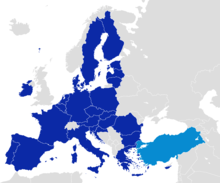
Turkey is a founding member of the OECD and G20. The country's economy ranked as the 18th-largest in the world and 8th-largest in Europe by nominal GDP in 2023. It also ranked as the 11th-largest in the world and 5th-largest in Europe by PPP in 2023. According to the IMF, as of 2022, Turkey had an upper-middle income, mixed-market, emerging economy. Turkey has often been defined as a newly industrialized country since the turn of the 21st century. The country is the fourth most visited destination in the world, and has over 1,500 R&D centres established both by multinational and national firms. Turkey is among the world's leading producers of agricultural products, textiles, motor vehicles, transportation equipment, construction materials, consumer electronics, and home appliances.
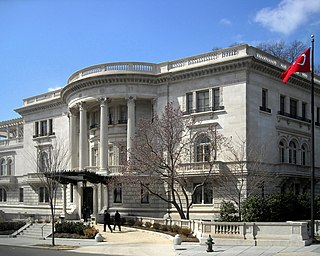
Physically bridging Europe and Asia and being above Africa, Turkey is a secular country that has historically pursued a Western-oriented foreign policy. To this end, Turkey uses its global diplomatic network—the third most extensive—of 252 diplomatic and consular missions.
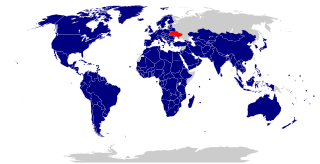
Ukraine has formal relations with many nations and in recent decades has been establishing diplomatic relations with an expanding circle of nations. The foreign relations of Ukraine are guided by a number of key priorities outlined in the foreign policy of Ukraine.
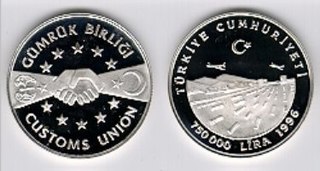
The European Union–Turkey Customs Union is a trade agreement between the European Union (EU) and Turkey. The agreement came into effect on 31 December 1995, following a 6 March 1995 Decision of the European Community–Turkey Association Council to implement a customs union between the two parties. Goods may travel between the two entities without any customs restrictions. The Customs Union does not cover essential economic areas such as agriculture, services or public procurement.
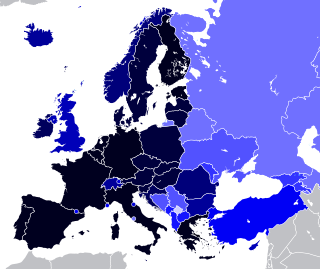
Turkey is a founding member of the United Nations, the Organisation of the Islamic Conference, the Organisation for Economic Co-operation and Development and the Organization for Security and Co-operation in Europe, has been in the Council of Europe since 1949, and in NATO since 1952. Since 2005, Turkey is in accession negotiations with the European Union, having been an associate member since 1963 and is also in European Customs Union. Turkey is also a member of the G20 industrial nations which brings together the 20 largest economies of the world.

The economy of Northern Cyprus is dominated by the services sector, which includes the public sector, trade, tourism and education. Industry contributes 22% of GDP and agriculture 9%. Northern Cyprus's economy operates on a free-market basis, with a significant portion of administration costs funded by Turkey. Northern Cyprus uses the Turkish lira as its currency, which links its economic situation to the economy of Turkey.

Being part of the Kingdom of Denmark, the foreign relations of Faroe Islands are handled in cooperation with the Danish government and Government of Faroe Islands.

Swiss–Turkish relations are foreign relations between Switzerland and Turkey. Switzerland has an embassy in Ankara and a consulate-general in Istanbul. Turkey has an embassy in Bern and consulates-general in Zürich and Geneva. Both countries are full members of the Council of Europe, the OECD, the OSCE and the WTO.

Indonesia and Turkey established diplomatic relations in 1950. Diplomatic relations are particularly important because both are Muslim-majority countries as well as modern democracies. Indonesia has an embassy in Ankara and consulate-general in Istanbul. Turkey has an embassy in Jakarta, and honorary consulate in Medan since May 1996. Both countries are full members of the World Trade Organization (WTO), Organisation of Islamic Cooperation (OIC), D-8 Organization for Economic Cooperation, MIKTA and the G-20 major economies.

The visa policy of Turkey deals with the requirements that a foreign national wishing to enter Turkey must meet to be permitted to travel to, enter and remain in the country.

Diplomatic relations between Turkey and Venezuela were established in 1950.

Colombia–Turkey relations are foreign relations between Colombia and Turkey. Diplomatic relations between the two countries were established in 1959. Turkey has an embassy in Bogotá while Colombia has an embassy in Ankara.

Niger–Turkey relations are the foreign relations between Niger and Turkey. Turkey has an embassy in Niamey since January 2012 while Niger has an embassy in Ankara since October 2012 and consulates in Istanbul, Bursa and Antalya. 29 international treaties and agreements were signed between the 2 countries since 2012.

Estonia-Turkey relations are foreign relations between Estonia and Turkey. Estonia has an embassy in Ankara and Turkey has an embassy in Tallinn. Both countries are full members of Council of Europe and of NATO. Estonia is also an EU member and Turkey is an EU candidate.

Burkina Faso–Turkey relations are the foreign relations between Burkina Faso and Turkey. Turkey and Burkina Faso enjoy strong and friendly bilateral relations. Bilateral relations gained momentum after the opening of the Turkish Embassy in Ouagadougou and the Embassy of Burkina Faso in Ankara in 2012 and in 2014 respectively.
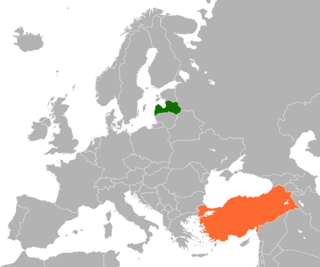
Latvia–Turkey relations are the foreign relations between Latvia and Turkey. Both countries are members of NATO and the Council of Europe.

Slovakia–Turkey relations are the foreign relations between Slovakia and Turkey. In 1993, Turkey was one of the first states to formally recognize both the Slovakia and Czech Republic as separate, and sovereign states after the dissolution. Diplomatic relations and the Turkish Embassy in Bratislava were established on January 4, 1993. Before the 1990s split, Turkey held close but also tense relations with Czechoslovakia, specifically during the Cold War due to NATO and the rest of Europe pushing and supporting anti-communist sentiment and approach for its members, such as Turkey, towards Eastern Bloc countries of which Czechoslovakia was a part of.
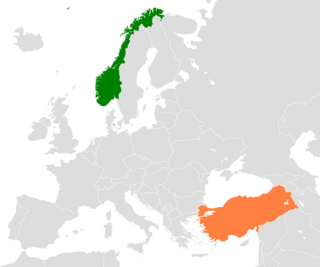
Norway–Turkey relations are foreign relations between Norway and Turkey. The bilateral relations were established in 1926.

